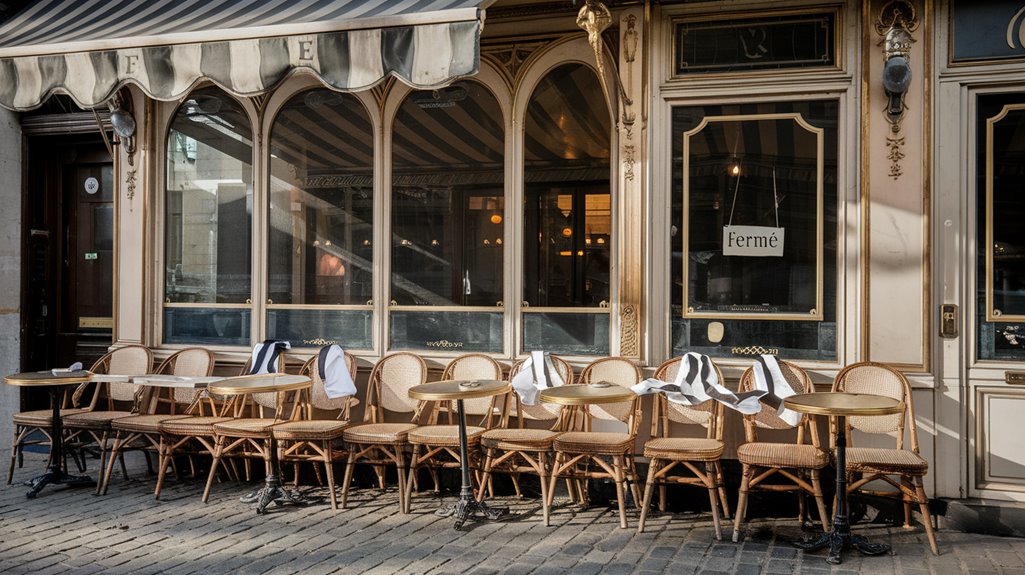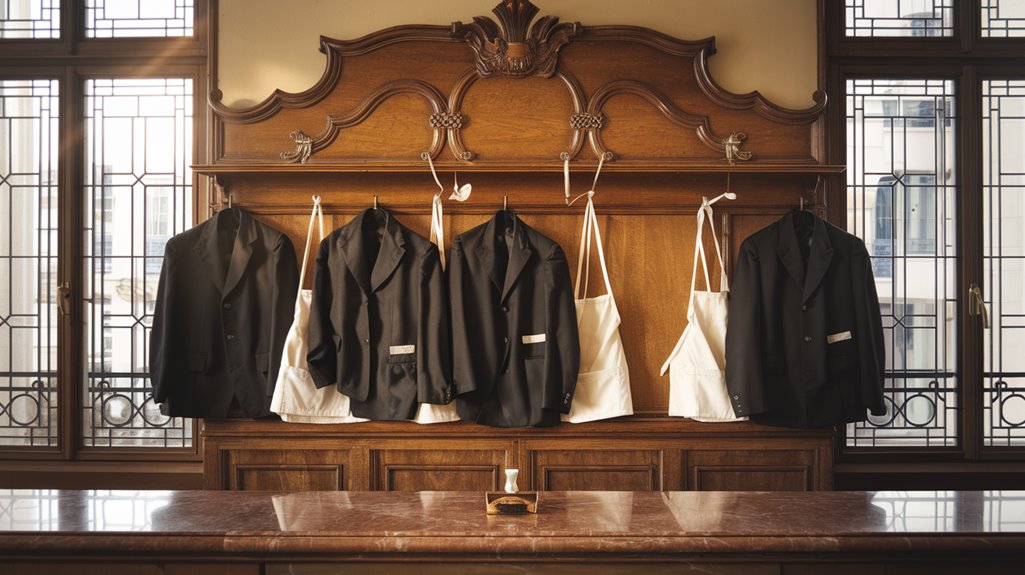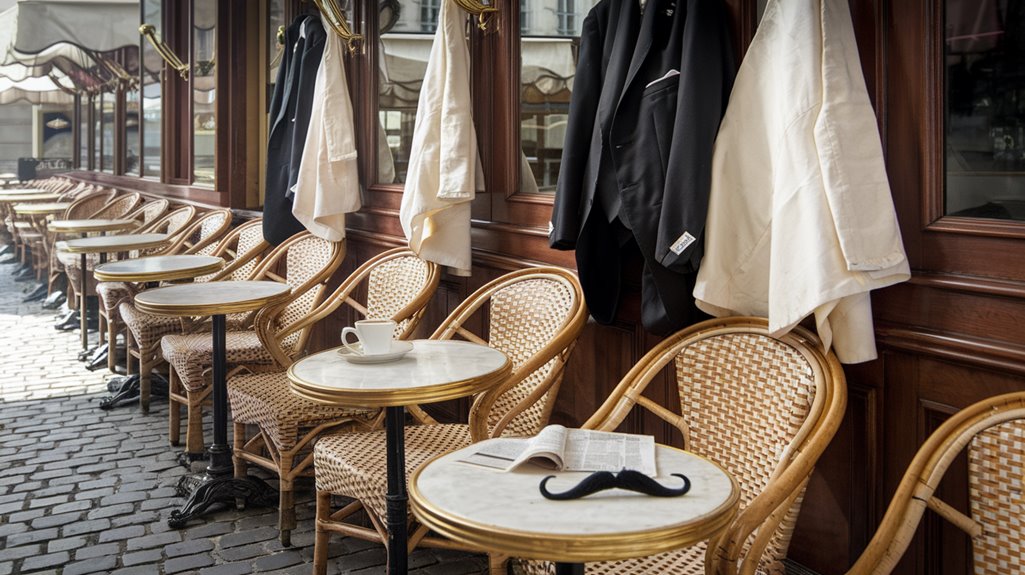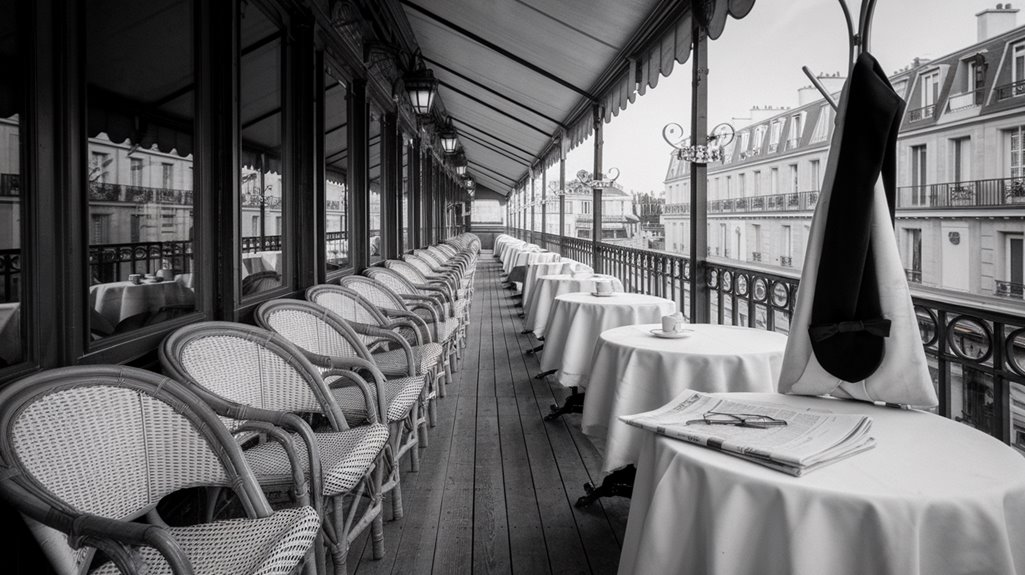French Waiters Once Struck for the Right to Grow Mustaches
Like Samson's hair holding his strength, a French waiter's mustache in 1907 carried the weight of his dignity. You might think it's trivial to strike over facial hair, but this 16-day standoff in Paris revealed deeper tensions about class, respect, and workers' rights. When restaurant owners demanded clean-shaven faces, they didn't just challenge personal grooming—they sparked a revolution that would reshape labor relations throughout the French service industry. Let's explore how a simple mustache became the unlikely hero of workers' rights.
The Cultural Battle Behind the Facial Hair Ban

While mustaches may seem like a trivial fashion choice today, they sparked a significant cultural battle in early 20th century France, where facial hair represented far more than personal grooming preferences.
You'd find mustaches adorning the faces of wealthy aristocrats and military officers, serving as powerful symbols of status, masculinity, and authority.
Restaurant owners, aiming to recreate the atmosphere of elite households, enforced a strict mustache ban on their waiters, mirroring the clean-shaven appearance of domestic servants.
This regulation deeply affected cultural identity, particularly for veteran waiters who'd earned their mustaches through military service.
The mustache symbolism became a flashpoint in French society, highlighting the stark divide between social classes and sparking intense debates about personal dignity and workers' rights.
Led by trade unions, approximately 500 waiters took to the streets in protest, demanding not only the right to grow facial hair but also better working conditions and fair compensation.
The protests gained substantial backing from the public, with peaceful demonstrations occasionally turning violent when confronting non-striking workers.
From Clean-Shaven Rules to Labor Revolution
As tensions mounted in early 20th century France, the strict clean-shaven rules imposed on waiters became the unlikely spark for a powerful labor revolution.
You'd have found mustaches everywhere in European society – adorning the faces of military officers, policemen, and wealthy gentlemen – except on restaurant servers, who were forced to remain clean-shaven to reinforce their lower social status.
On April 17, 1907, waiters transformed this facial hair restriction into a battle for labor rights. They walked off their jobs, demanding not just the freedom to grow mustaches, but also better wages and one day off per week. The press initially met their demands with mockery and disbelief.
With support from trade unions and socialist politicians, their 16-day strike challenged deep-rooted social hierarchies. The mustache symbolism became a rallying cry for dignity and autonomy in the workplace. Those unable to grow natural facial hair even resorted to wearing fake mustaches during demonstrations.
The Day Paris Restaurants Stood Still
When the clock struck 6:30 p.m. on April 17, 1907, Paris's dining scene ground to a dramatic halt.
In a display of waiter solidarity, hundreds of servers simultaneously stopped their service, cleared their tills, and walked off the job. The strike tactics quickly spread across the city's most prestigious establishments, including the Café de la Paix and Café Riche.
You would've witnessed an extraordinary scene at these grand boulevards as:
- Waiters removing their aprons and collecting final payments
- Proprietors hurriedly clearing terraces
- Restaurants lowering their shutters
- Bewildered customers watching in amused disbelief
The striking waiters didn't stop there – they actively recruited other clean-shaven colleagues from different establishments to join their cause. Many of these men were proud war veterans who felt particularly humiliated by the mustache ban.
What started with hundreds soon grew to thousands, effectively paralyzing Paris's restaurant industry for 16 dramatic days.
How a Mustache Became a Symbol of Freedom
Before the historic 1907 strike, you'd find a curious sight in Paris's finest restaurants: clean-shaven waiters serving mustachioed patrons.
This stark contrast wasn't just about fashion – it reflected deep-rooted class distinctions in French society.
For wealthy Frenchmen, mustaches symbolized status and power, while waiters were forced to maintain smooth faces to reinforce their lower social standing.
Working-class men faced these restrictions due to hygiene concerns from employers.
But many of these waiters were proud military veterans who'd earned the right to wear mustaches during their service.
Their forced clean-shaven appearance felt like an attack on their dignity and masculinity. This struggle echoes the spirit of Mustache March tradition, which began as a symbol of protest against military facial hair regulations.
Through their strike, these waiters transformed mustache symbolism into a powerful statement of freedom expression.
When they finally won the right to grow facial hair, it wasn't just about appearances – it represented a victory against class oppression and a step toward personal liberty.
The Victory That Changed French Service Industry

The April 1907 waiter's strike in Paris proved far more consequential than anyone expected. When 500 waiters walked out demanding better waiter wages and the right to grow facial hair, they sparked a revolution in the service industry that would reshape workplace norms.
Key changes that emerged from the strike include:
- Introduction of standardized uniforms across restaurants
- Implementation of fairer pay structures
- Establishment of one day off per week
- Removal of personal appearance restrictions
The victory wasn't just about mustache symbolism – it demonstrated how collective action could challenge unfair practices. Just as today's workers seek pay hikes for inflation, the waiters' demands reflected broader economic concerns of their era.
Similar to the massive public sector job cuts currently threatening France, workers in 1907 also faced employment uncertainty that fueled their protests.











